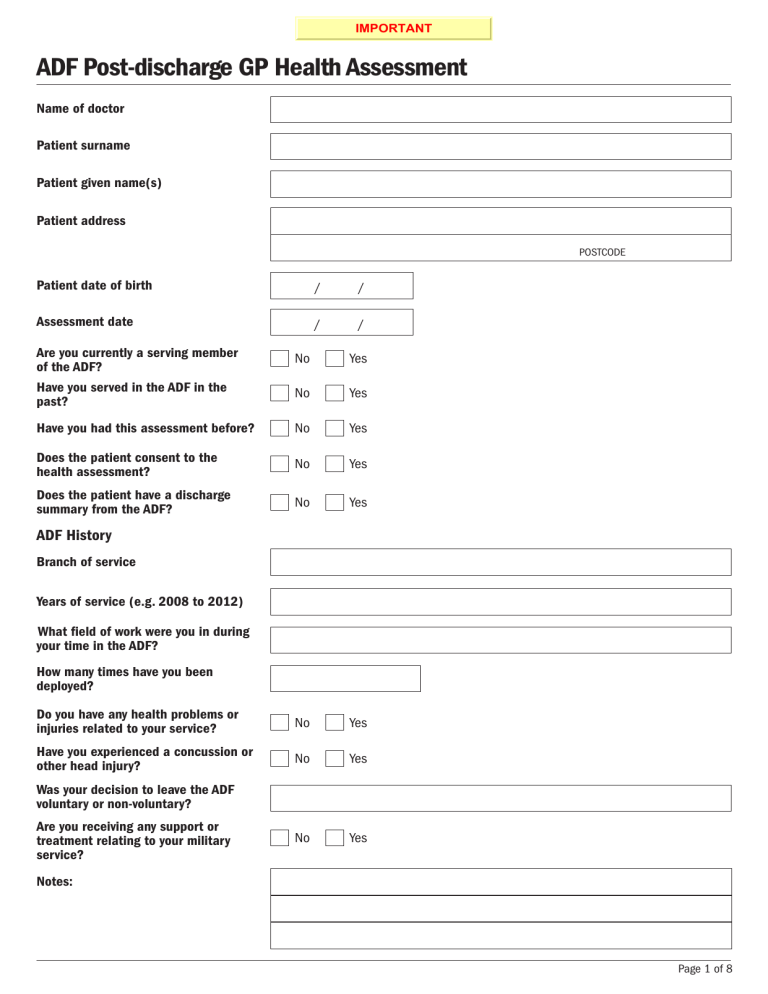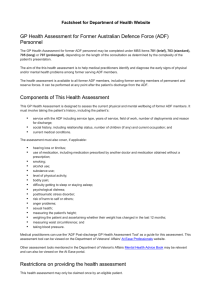ADF Post-discharge GP Health Assessment - At Ease

IMPORTANT
ADF Post-discharge GP Health Assessment
Name of doctor
Patient surname
Patient given name(s)
Patient address
Patient date of birth
Assessment date
Are you currently a serving member of the ADF?
Have you served in the ADF in the past?
Have you had this assessment before?
Does the patient consent to the health assessment?
Does the patient have a discharge summary from the ADF?
ADF History
Branch of service
Years of service (e.g. 2008 to 2012)
What field of work were you in during your time in the ADF?
How many times have you been deployed?
Do you have any health problems or injuries related to your service?
Have you experienced a concussion or other head injury?
Was your decision to leave the ADF voluntary or non-voluntary?
Are you receiving any support or treatment relating to your military service?
Notes:
No
No
/ /
No
No
No
/ /
Yes
Yes
Yes
No Yes
No Yes
No
Yes
Yes
Yes
POSTCODE
Page 1 of 8
Social History
Are you married or in a relationship?
Do you have children?
What is your current occupation?
No
No
Yes
Yes
Medical conditions
What are your current medical conditions?
Hearing
Do you have difficulty with your hearing or ringing in your ears?
Notes:
No Yes
Medications
Do you take any prescribed or over the counter medications?
Notes:
No Yes
Smoking
How many cigarettes do you smoke a day?
Are you interested in quitting?
Notes:
No Yes
Page 2 of 8
Alcohol (AUDIT-C)
How often do you have a drink containing alcohol?
How many drinks containing alcohol do you have on a typical day when you are drinking?
How often do you have six or more drinks on one occasion?
Never (0) – skip following 2 questions
Monthly or less (1)
2–4 times a month (2)
2–3 times per week (3)
>= 4 times a week (4)
1 or 2 (0)
3 or 4 (1)
5 or 6 (2)
7 to 9 (3)
>= 10 (4)
Never (0)
Less than monthly (1)
Monthly (2)
Weekly (3)
Daily or almost daily (4)
Scoring: In men a score of 4 or more should be investigated further; in women a score of 3 or more should be investigated further.
© World Health Organisation 2001. Used with permission
AUDIT-C Total score:
0
Score
Substance use
In the past year, how often have you used illicit drugs?
If yes, which drugs?
Does the use of alcohol or drugs cause any problems in your life?
If yes, would you like some assistance in managing this issue?
Never - skip following question
Monthly or less
2–4 times a month
2–3 times per week
>= 4 times a week
Amphetamines
Cannabis
Cocaine
Ecstasy
Hallucinogens
Heroin
Inhalants
Pharmaceuticals
Steroids
Other
Friends
Family
Money
Other
None
Yes
No
Notes:
Enter ‘X’ alongside choice
Choice
Page 3 of 8
Physical Activity
How many times a week do you do >30 minutes of moderately intense physical activity?
Notes:
None
1–2 times/week
3–4 times/week
5 or more times/week
Enter ‘X’ alongside choice
Choice
Pain
© The RAND Corporation. Used with permission
How much bodily pain have you had during the past
4 weeks?
None
Very mild
Mild
Moderate
Severe
Very severe
Notes:
Enter ‘X’ alongside choice
Choice
Sleep
Do you have difficulty getting to sleep or staying asleep?
No
Difficulty getting to sleep
Difficulty staying asleep
Notes:
Enter ‘X’ alongside choice
Choice
Page 4 of 8
Distress (K10)
In the past 4 weeks: None of the time
(1)
A little of the time
(2)
Enter number in brackets below choice
Some of the time
(3)
Most of the time
(4)
All of the time
(5)
1. About how often did you feel tired out for no good reason?
2. About how often did you feel nervous?
*3. About how often did you feel so nervous that nothing could
calm you down?
4. About how often did you feel hopeless?
5. About how often did you feel restless or fidgety?
*6. About how often did you feel so restless you could not sit
still?
7. About how often did you feel depressed?
8. About how often did you feel that everything is an effort?
9. About how often did you feel so sad that nothing could
cheer you up?
10. About how often did you feel worthless?
SUB TOTAL - for each column
0 0 0 0 0
* Questions 3 and 6 are not asked if the person answered ‘none of the time’ to the preceding question, in which case questions
3 and 6 would automatically receive a score of one.
© World Health Organization 2003. Used with permission
Sum of sub-total amounts
K10 Total score:
0
For the military and ex-military, a score of 17 or more is considered positive for distress. Further assessment of mental status may be indicated, using the DASS-21 or similar measure.
Posttraumatic stress (PC-PTSD)
In your life, have you ever had any experience that was so frightening, horrible, or upsetting that, in the PAST month, you:
1. Have had nightmares about it or thought about it when you did not want to?
2. Tried hard not to think about it or went out of your way to avoid situations that remind you of it?
3. Were constantly on guard, watchful or easily startled?
4. Felt numb or detached from others, activities, or your surroundings?
Prins, Ouimette, & Kimerling, 2003. Available for the National Center for PTSD at www.ptsd.va.gov
No
No
No
No
Yes
Yes
Yes
Yes
Scoring: In primary care, 2 or more ‘yes’ responses is considered positive.
PC-PTSD Total ‘Yes’ responses:
Risk of harm to self or others
Are there times when things seem so hopelss that you have thought about:
1. Killing yourself or harming yourself in some way?
2. Ending the lives of others around you?
© Commonwealth of Australia 2013. Used with permission
No
No
Yes
Yes
If the patient responds ‘yes’ to either question, check for recency and intention to act on these thoughts. Practice nurses and health workers should immediately inform the GP if the patient responds ‘yes’ to either question.
In the case of a patient who has intent to suicide or harm others, consult the RACGP Guidelines for Preventive Activities in
General Practice, www.racgp.org.au/your-practice/guidelines/redbook/psychosocial/suicide/
Anger
Over the PAST MONTH have you had thoughts or concerns that you might hurt or lose control with someone?
Enter notes in the spaces provided
Assistant Secretary of Defense for Health Affairs. DD Form 2796, dated Sept. 2012. Used with permission
Page 5 of 8
Sexual Health
Are you concerned about your sexual health?
No
Notes:
Yes
Other
Do you have any other health concerns that you would like to discuss?
No
Notes:
Yes - please specify
BMI, waist circumference and blood pressure
Record height
Record weight
Record waist circumference
Record blood pressure
Has your weight changed (loss or gain) in the last year
Summary
Please list any problems
Recommendations
Referrals
GP review
Next appointment
Disclaimer
The ADF Post-discharge GP Health Assessment tool was developed by Flinders University for the Department of Veterans’ Affairs. The tool is not a replacement for professional advice; the Department of Veterans’ Affairs and Flinders University will not be responsible for any damage resulting from use of the tool.
Save Print Clear
Page 6 of 8
Information for GPs
Department of Veterans’ Affairs (DVA)
DVA may fund treatment for veterans and some former ADF members with posttraumatic stress disorder, depressive and anxiety disorders, cancer, tuberculosis and alcohol and other substance use disorders, whatever the cause (the condition does not have to be related to service).
Contact DVA on 133 254 or www.dva.gov.au/health-and-wellbeing/treatment-your-health-conditions to find out more or to check eligibility.
Where a diagnosed condition may be caused or aggravated by Defence service, the former ADF member should be encouraged to contact DVA on 133 254 to discuss their eligibility for treatment and/or compensation. Further information can be found on the DVA website at www.dva.gov.au/ .
Veterans and Veterans Families Counselling Service (VVCS)
VVCS provides free and confidential, nation-wide counselling and support for war and service-related mental health and wellbeing conditions. Support is also available for relationship and family matters that can arise due to the unique nature of military service.
For help, to learn more or to check eligibility contact VVCS on 1800 011 046 or visit www.vvcs.gov.au
Obtaining a copy of the ADF discharge summary
ADF members who have left service since May 2008 and do not have their ‘Clinical Summary Transfer of Health Care form’ can access a copy from Personnel Records (RAN/RAAF) or Army Records Office.
The transfer of health care form lists diagnoses and other health problems, allergies and reactions, current medications, current health care requirements and ongoing treatment needs.
Defence Health Records
Defence Archive Centre - Fort Queenscliff (DAC-FQ)
GPO Box 1932
Melbourne VIC 3001 adf.persrecordenquiries@defence.gov.au
Guide and Quick Reference Guide
A detailed Guide and a Quick Reference Guide to the ADF Post-Discharge GP Health Assessment are available. These resources detail key actions, treatment options and referral pathways following the completion of this assessment. These are resources are available on the At Ease Professional website http://at-ease.dva.gov.au/professionals/ .
Useful links
• A list of surgeons can be found at www.surgeons.org/find-a-surgeon
• A list of psychologists can be found at www.psychology.org.au/findapsychologist
• A list of mental health trained social workers can be found at www.aasw.asn.au/find-a-social-worker/search
• A list of mental health trained occupational therapists can be found at www.otaus.com.au/find-an-occupational-therapist/
• Private psychiatrists: GPs can access a list at www.ranzcp.org/Resources/find-a-psychiatrist.aspx
Page 7 of 8
References
1. Bradley, K.A., et al., AUDIT-C as a brief screen for alcohol misuse in primary care . Alcohol Clin Exp Res, 2007. 31(7):
p. 1208-17.
2. Bush, K., et al., The AUDIT alcohol consumption questions (AUDIT-C): an effective brief screening test for problem drinking.
Ambulatory Care Quality Improvement Project (ACQUIP). Alcohol Use Disorders Identification Test . Arch Intern Med, 1998.
158(16): p. 1789-95.
3. McFarlane, A.C., et al., Mental health in the Australian Defence Force: 2010 ADF Mental Health and Wellbeing Study : Full
report. 2011, Department of Defence: Canberra.
4. Australian Centre for Posttraumatic Mental Health, Mental Health Advice Book for Practitioners: Helping Veterans with Common
Mental Health Problems 2012, Canberra: Department of Veterans’ Affairs.
5. Health status of Vietnam veterans. III. Reproductive outcomes and child health. The Centres for Disease Control Vietnam
Experience Study. JAMA, 1988. 259(18): p. 2715-9.
6. Andrews, G. and T. Slade, Interpreting scores on the Kessler Psychological Distress Scale (K10) . Aust N Z J Public Health,
2001. 25(6): p. 494-7.
7. Furukawa, T.A., et al., The performance of the K6 and K10 screening scales for psychological distress in the Australian National
Survey of Mental Health and Well-Being . Psychol Med, 2003. 33(2): p. 357-62.
8. Australian Centre for Posttaumatic Mental Health, Australian Guidelines for the Treatment of Acute Stress Disorder and
Posttraumatic Stress Disorder.
2013, ACPMH: Melbourne.
9. Prins, A., The primary care PTSD screen (PC-PTSD): development and operating characteristics . Primary Care Psychiatry, 2003.
9(1): p.9-14.
Page 8 of 8


